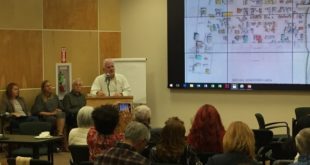The College of Engineering and Technology (CET) at Northern New Mexico College (NNMC) has been awarded $433,689 by the National Science Foundation to develop a cybersecurity concentration in its ABET-accredited Bachelor in Information Engineering Technology (IET).
The Principal Investigator of the project is Dr. Jorge Crichigno, Chair of the CET. The project is the result of several years of preparation that include state-of-the-art laboratory technology and advanced instruction capability in cybersecurity.
Dr. Crichigno’s collaborators include Los Alamos National Laboratory (LANL), the Florida Center for Cybersecurity (FC2) in Florida, the Western Academy Support and Training Center (WASTC) in California, and the Network Development Group (NDG) in North Carolina.
“I am very excited that Northern will create a clear career pathway for our students through a cybersecurity concentration embedded into the IET program,” said Dr. Crichigno.
“Cybersecurity professions are some of the highest paid occupations in the country. Moreover, professionals in this area are not only in high demand in New Mexico, but also across the country. For example, according to the U.S. Bureau of Labor Statistics, the number of job openings for information security analysts alone will increase by almost 20 percent between 2014 and 2024. I am convinced that this project will have a positive impact on our students’ preparation, and enable them to benefit from life-long opportunities as a result,” Dr. Crichigno added.
The three-year grant will allow NNMC in partnership with the University of South Florida (USF) to create advanced curricular and training material for 100-level to 400-level courses enriched with a large number of virtual laboratories (vLabs) covering the fundamental principles of cybersecurity.
The vLabs and training manuals will be portable, ready to use and deployable in a standard virtual environment without the need for configuration or package installation, thus promoting resource sharing. The curriculum will also meet cybersecurity training standards set by the National Security Agency (NSA) and the Committee on National Security Systems (CNSS).
Further, NNMC and USF will establish an alliance with industry organizations and with LANL, including its National Security Education Center (NSEC), to create internship opportunities in cybersecurity.
The alliance will strengthen the collaboration with industry and federal laboratories, in efforts to bolster national security training and education.
NNMC will also partner with the New Mexico Department of Workforce Solutions and a regional rural high-school to strengthen the cybersecurity pipeline and increase the number of locally trained professionals to fill regional demands.
Finally, the educational model and curricular material will be available and further disseminated through well-established channels, such as the WASTC and NDG. WASTC provides computer science and IT training across the country and supports hundreds of higher education institutions that have an interest in adopting vLabs. NDG is an industry leader in developing virtual laboratories using standardized technology. NDG partners (which are potential adopters of the curricular materials to be developed here) include more than 9,500 academic institutions in more than 100 countries.
“This grant will open incredible opportunities for our students. Cybersecurity is one the most in-demand fields at present. Through this grant, NNMC will be able to address the educational needs of our community in keeping with technological advancements,” said Dr. Ivan Lopez, NNMC’s Provost and Vice President for Academic Affairs.
“This project will also strengthen our collaboration with the University of South Florida, which will tremendously benefit our students and faculty,” Dr. Lopez added.
Northern New Mexico College is a minority-serving institution, offering bachelor, associate, and certificate programs.
The college primarily serves rural communities within a 40-mile radius of its campus in Española, New Mexico, within one of the most underserved regions in the state.
 SantaFeToday.com Santa Fe’s Hometown News
SantaFeToday.com Santa Fe’s Hometown News

